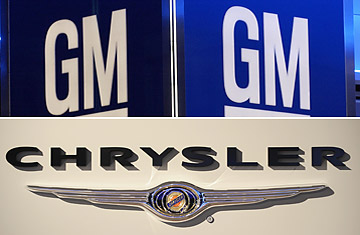
There's sad news from Detroit. Embattled Chrysler appears to have run out of rope, and has filed for bankruptcy — a course confirmed by President Obama at a Thursday press conference. The reason for the fast fall into Chapter 11 is that some of Chrysler's debt holders refused to take the cash settlement offer put together by Steve Rattner and the Automotive Task Force, the terms of which they found rather harsh.
Over at General Motors, CEO Fritz Henderson on Monday outlined a tough deal for bondholders as well, as the automaker scrambled to reduce its debt. The prospects for that deal are better than Chrysler's, but they are far from guaranteed.
See the world's most influential people in the 2009 TIME 100.
At the White House press conference, Obama thanked most of the major players for their let's-all-take-our-medicine determination, but he criticized a group of financial firms — the holdouts — for their unpatriotic greed. "While many stakeholders made sacrifices," Obama said, "a group of investment firms and hedge funds decided to hold out for the prospect of an unjustified taxpayer-funded bailout." And then he added, "I do not stand with them."
Mr. President: Maybe you should. One fact that's not getting too much attention in these prospective deals, both at Chrysler and GM, is that they are a bit short on fairness. Just consider the plight of American taxpayers who have so far loaned $15.4 billion to GM and another $4 billion to Chrysler. As part of the latest flurry of announcements, both automakers are signaling that (a) they are not likely going to pay most of the government loans back, and (b) they will need many billions more. (See TIME's top 10 Chrysler moments.)(/p>
At the same time, an important feature of the latest Detroit dealings is the lopsided favoritism shown the United Auto Workers (UAW). Take the Chrysler plan: Taxpayers were to trade in a $4 billion IOU (i.e., the government loans) for about 5% of Chrysler's stock. The UAW, on the other hand, was trading in a $4.5 billion IOU (related to its VEBA health-care trust for retirees) in return for 55% of Chrysler stock. Does that seem fair? A third group, the secured debt holders, were to trade in a $6.9 billion IOU and get $2 billion in cash — an amount that was later raised to $2.25 billion to mollify disgruntled creditors, though it still failed to win their support.
Next, look at GM's offer. The unsecured bondholders are owed $27 billion by GM, and they are being asked to trade that IOU for a 10% equity stake. The UAW's VEBA trust, on the other hand, is trading in a $10.2 billion IOU and getting a 39% equity stake. If these were poker chips, you could say the croupier has arbitrarily decided to value bondholders' chips at 37 cents apiece and the UAW's VEBA chips at $3.90 each.
One might argue that given GM's troubled state, the market value of the bonds is not $27 billion but more like $3 billion. But if you accept that troubled-debtor logic, then it's only fair to apply the same logic to the money owed by Chrysler to the UAW's VEBA — so its chips should be marked down as well. (In fact, by law the VEBA's IOU is junior to the bondholders' IOU.) Thus, the VEBA's IOU should not translate into a 39% equity stake but a small sliver of that. (Read about Detroit's attempts to renew itself.)
Another popular argument against bondholders is that they made bad investment choices, so their steep losses are well deserved. But union leaders in Detroit negotiated the richest benefits packages of any industry — GM's health-care outlays grew so big that one Wall Street analyst dubbed the company "an HMO on wheels" — and that played some role in the declining competitiveness of GM and Chrysler. Don't the autoworkers and their union leaders bear some responsibility for that?
Autoworkers have certainly made sacrifices recently as they trim wages and benefits to help make their employers more competitive and to save their jobs. That's part of the normal — and sometimes painful — give and take between employer and employee as companies seek to keep their workforce happy and their product pricing competitive. But when employee concessions become a currency equal in value — or even exceeding — the rights of bondholders, as it did in these latest negotiations, realism is replaced with hopeful illusions.
It's no wonder that some of Chrysler's creditors said no, and it's also no surprise that a group of GM bondholders is putting forward an entirely new plan for that automaker, cutting out the government, which is slated to become a majority owner. The creditors' new plan suggests giving them a controlling equity interest instead and keeping the government (i.e., American taxpayers) as a creditor. Obama has made it clear that he has no interest in running a car company, so this offer may be one worth considering.
Besides, if either of these companies is going to have a future, it's going to have to start with a renewed sense of realism. The rights of bondholders is a good place to start.
